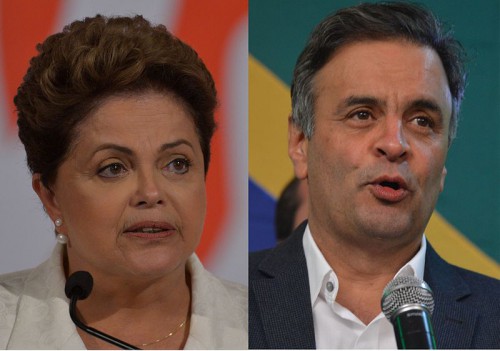by Sylvain Gaulier
As Brazilians are awaiting to cast their vote for the next president, the race is still up in the air. While the country leans closer to the left side, there is still uncertainty in the rounds to come. Incumbent Brazilian President, Dilma Rousseff, won the first round of the presidential election with 41 percent of the votes ahead of Aecio Neves with 34 percent and Marina Silva with 21 percent.
The result came as a surprise to many political analysts and poll institutes who labelled Marina Silva as a very serious challenger to Rousseff’s reelection, according to Le Courrier International.
Le Monde reported Rousseff said, “The struggle continues now and it will be a victorious struggle.” Rouseff is confident with the country behind her, but the uncertainty is enough for the “struggle.” However, the second round will be very indecisive until the Election Day on Oct. 26.

Marina Silva, candidate of the Brazilian Socialist Party (BSB), gave her support to Aecio Neves, president of the Brazilian Social Democracy Party, for the second round. The main stake of the second round is whether all Silva’s supporters will entrust their confidence in Neves in two weeks.
Silva’s stellar political ascension propelled her as the Socialist Party candidate after former BSB candidate, Eduardo Campos, died in a plane crash last August. Silva failed to advance to Oct. 26, run-off because of her controversial positions. Although Silva’s evangelical beliefs attracted a large chunk of the conservative Brazilian population, her positions against same-sex marriage and abortion alienated more progressive voters.
According to Le Monde, 53 percent of Brazilians do not favor same-sex marriage.
BSB candidate has been the front-runner in the political race until two political controversies burst out. She removed her support for same-sex marriage from her previous party’s promise. In the meantime, she also backtracked on her intentions to use nuclear energy. Thus, her political rivals pictured her as a flimsy and unreliable presidential candidate, according to Le Courrier International.
The political campaign opposed two main visions for the future of the seventh-largest economic country. Millions of Brazilian voters had to choose between remaining faithful to Lula’s legacy, immensely popular former Brazilian President, through his Workers’ Party successor Rousseff or shifting the political wheel to the moderate liberal wing to spur Brazilian economy.
Brazil is struggling to keep up with the other BRIC countries, which include Russia, India, and China. Although the first female Brazilian President pledged to continue the social politics started by her predecessor, Lula, Brazilian economy entered in recession on the eve of presidential election, according to Le Courrier International.
Rousseff denies this fact as Acercando Naciones reports: “The fall of the current economic activity is momentary. We are not in recession, there are increasing employment and wages.” Inflation has also reached a concerning level of 6.5 percent impacting the purchasing power of the growing middle-class.
A year after achieving a 77 percent approval rate, Rousseff, who is often compared to Angela Merkel, was only supported by 30 percent of Brazilians at the peak of the social protests last June. An unprecedented wave of protesters marched against corrupted elites while asking for improved education, health, and public transportation systems instead of massive public spending for the 2014 FIFA World Cup.
Neves often emphasizes on his ideological bound with former President Fernando Enrique Cardoso. He holds Rousseff responsible for rising inflation and Brazil’s largest company, Petrobas, corruption scandal impacting Rousseff’s political circle. His political party has an incredible opportunity to lead Brazil after 12 years of power of the Workers’ Party, according to Le Courrier International.
Suffolk student Fernando Silva gave his opinion and said, “After watching the primary debate for the Brazilian election, I became an Aecio Neves supporter. He showed me that he is prepared and has a plan lead the country to another economical surge. Neves also has received support from Marina Silva, whom had a lot of support from the Brazilian population.”
On the political and corruption topics, Rousseff will strengthen the laws against corruption if she is elected. She also wants to hold a referendum on a new political reform system, where she failed to carry on this project after the social protests last June. Neves is determined to reduce the number of ministers, institute a one term presidential mandate, and decrease the political influence on the public contracts awarding.
Silva added, “I see a lot of potential in Brazil, but corruption in office has slowed down the development drastically.”





